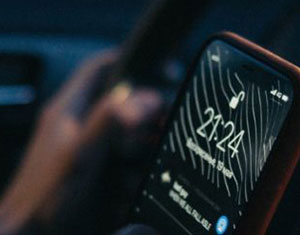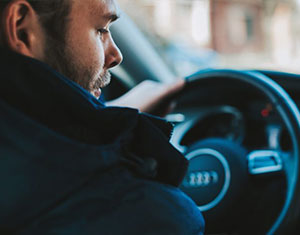Atlanta Distracted Driving Injury Lawyer for Catastrophic Injury & Wrongful Death
Table of Contents
Nowadays, there are more distractions for drivers than ever before. Between texting, talking on the phone, rubbernecking, and the various other distractions we are all subject to, the act of driving can become significantly more dangerous. Drivers who do not give proper attention to the road and their surroundings put themselves and others at risk.
When individuals have been injured as a result of a distracted driving accident in Georgia, we examine all the evidence to determine liability. In many cases of distracted driving accident negligence, the operator was texting or talking on the phone, causing them to drive recklessly.
Common Examples of Distractions While Driving
Examples of distraction behind the wheel include:
- Sending a text message.
- Talking on the phone.
- Applying makeup.
- Eating.
- Checking your work email.
- Changing the radio station.
- Lighting a cigarette.
- Using a navigation system.
- Talking to a passenger.
- Managing a pet in the car.
What Are Georgia’s Distracted Driving Laws?
As part of their duty to other drivers and pedestrians, the State of Georgia requires (O.C.G.A. §40-6-241) that all drivers must pay appropriate attention to their surroundings when operating their vehicles, prohibiting any activity that distracts the driver from safe operation.
Georgia’s distracted driving laws were further enhanced with the 2018 Hands-Free Georgia Act, O.C.G.A. § 40-6-241(b)(c)(d), which dictated new restrictions on cell phone use. Among the new provisions:
- Drivers cannot have a phone in their hand – or even touching any part of their body – while talking on that phone and driving.
- Motorists who opt for hands-free technology still can’t write, read, or send text messages or emails, nor may they utilize social media or internet sites while they’re on the road.
- Drivers are expressly barred from watching videos while operating a vehicle, with exceptions for GPS or other navigational videos. While continuous dash cameras are allowed, the use of phones or other electronic devices to record while driving is not.
- Motorists can listen to streaming music on their devices, so long as there aren’t videos displayed and they can’t touch the phone or activate those streaming music apps on their phone while driving. They will have to activate those apps before they get on the road. The law makes an exception for streaming music controlled by/listened through the vehicle radio.
Drivers who fail to exercise the required duty of care to pay attention to the road and their surroundings may be considered responsible. In order to hold another driver legally liable for your distracted driving accident injuries, you will generally be required to prove that the driver’s negligence, in some form, contributed to the cause of your injuries.
Further Reading: Georgia Tackles Texting and Driving Accidents
Proving Negligence and Causation in a Distracted Driving Lawsuit
There are a variety of factors that your attorney will examine to prove that the driver was acting negligently and that, as a result, you suffered an injury that could have been foreseeably prevented. While it is not always necessary for a victim to prove that the other driver was distracted in order to establish fault and gain compensation for your injuries, it does serve to strengthen your claim.
Collecting compelling supporting evidence is key to winning any Georgia personal injury case, and there are several forms of evidence that can be used to establish negligence in a distracted driving case. Some of the most notable examples include:
- An admission by the other driver.
- The responding police officer’s notes.
- The official accident crash report.
- Testimony from a witness.
- Cell phone records.
- Pictures or video.
- Expert accident analysis.
It is important that injured victims seek medical attention as soon as possible after a distracted driving crash, and that a detailed account of the incident and your injuries is taken so there is consistency across the crash report and your medical records. If you were suffering from pre-existing injuries at the time of the crash, inform the medical team of how the wreck caused further damage and pain to the area. These may be subject to special analysis that can uniquely affect your claim for damages.
Statute of Limitations For Distracted Driving Injuries
It is important to consider that the state of Georgia has a two-year statute of limitations (Ga. Code Ann. Sec. 9-3-33) for most auto accident injury claims. In the event that an injured victim has not brought a lawsuit within two years of the date of the wreck, they may be time-barred from bringing any legal action at all. It is essential to contact a personal injury attorney experienced in handling distracted driving cases to advocate on your behalf.
Further Reading: Understanding Modified Comparative Fault in Negligence & Personal Injury Cases
Damages and Compensation for Victims of Distracted Driver Injuries in Atlanta
Serious injuries can and do occur in Georgia distracted driving car wrecks. Victims may need extensive medical care, or even long-term care after the incident. Fortunately, by way of filing a civil lawsuit against the at-fault driver, you may be able to recover some of those losses, including:
- Medical expenses, including emergency care and ongoing treatments.
- Lost wages.
- Reduced or loss of earning capacity.
- Long term disability.
- Property damage.
- Pain and suffering, including emotional injuries.
- Diminished quality of life.
If you or a loved one has been badly injured due to a distracted driver’s negligence and would like to discuss what possible damages you could recover, contact Apolinsky & Associates, LLC, for a case evaluation.
Further Reading: Understanding Negligence Per Se in Georgia Injury Cases


















